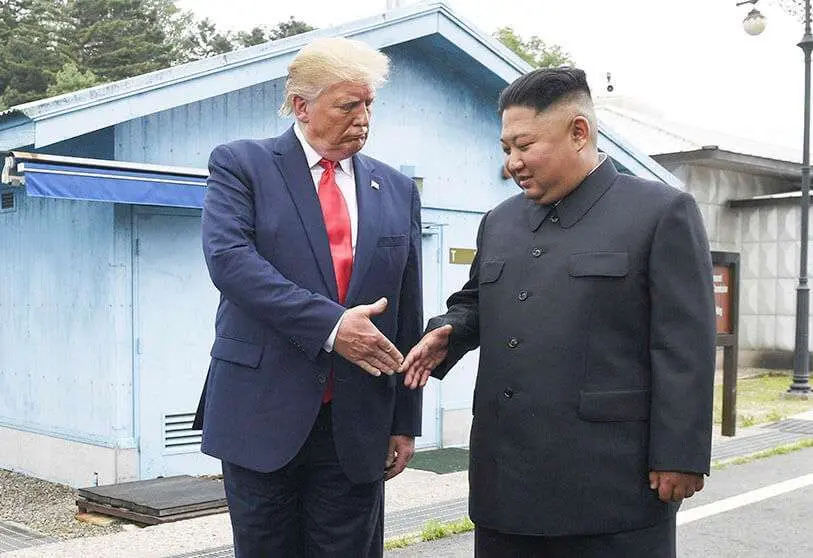Future prospects on the Korean peninsula

Since 2017, relations between the United States and North Korea have undergone sudden changes. After the strong tensions in 2017 with insults between Donald Trump and Kim Jong Un, threats of nuclear war, international sanctions and missile launches, a series of diplomatic contacts were initiated which facilitated and prepared the two summits between the leaders, as well as other summits between Kim Jong Un and the leaders of China, South Korea or Russia. However, if the year 2018 and early 2019 brought about a necessary détente between the US and North Korea and an incipient process of normalization of relations between the two Koreas, the end of 2019 and this year 2020 seem to be heading towards a stalling or even a worsening of the situation.
At the end of this year Kim Jong Un decided to change his traditional speech and replace it with a speech at the plenary meeting of the Central Committee of the Workers' Party of Korea. During the meeting, Kim made a series of statements suggesting that the tension between the US and North Korea could return to 2017 levels. In his statement, Kim said that North Korea's strategy would shift from dialogue to "real action with impact" in order to "make [the US] pay for the sufferings endured by our people so far and for the development that has been slowed down so far. He added that Korea was no longer bound by any commitments, warning that "the world would see a new strategic weapon in the near future".
This statement only confirms that the stalemate that followed the failed summit in Hanoi, which ended abruptly, may lead to a worsening of the geopolitical situation on the Korean peninsula and a prolongation of the status quo. This change of strategy announced by Kim Jong Un could take the form of a further escalation through the launching of medium-range missiles, including the launching of an intercontinental missile or the launching of missiles from submarines in order to demonstrate their technological capabilities. Although it cannot be ruled out that the actual shocking action he referred to in his speech will be a nuclear test, its likelihood is low because of the even greater pressure that would fall on the country.
The breakdown of the dialogue in Hanoi has only convinced the North Korean leader of the importance of maintaining his nuclear arsenal and military capabilities. According to the North Korean leader, the failure of the process was due to the alleged bad faith of the US, which has continued to impose sanctions, carry out military exercises and make increasingly demanding requests that would have jeopardised national dignity. The truth is that the inability of the parties to agree on the concept of denuclearization is the basic problem preventing mutual understanding.
Because despite the fact that in the Singapore joint declaration they committed themselves to creating a peace regime and to the complete denuclearisation of the peninsula, what they understand by denuclearisation is very different. For North Korea, denuclearisation would mean that the United States would give up extending its nuclear umbrella over South Korea and, very probably, over Japan. For the U.S., denuclearization would mean the abandonment of nuclear weapons by North Korea in a "complete, verifiable and irreversible" manner. Both positions are completely unacceptable to the other side, leading the controversy to a dead end. Neither North Korean hopes of seeing international sanctions on the country's economy reduced, nor Donald Trump's hopes of a victory on the international stage near the 2020 elections have been fulfilled.
In recent months the momentum gained during the various summits seems to have faded away and this year there is unlikely to be much change in view of the international situation. Firstly, this year 2020 is an election year in the USA. We are just 9 months away from the presidential elections and Trump is running for re-election, which is going to absorb more and more of his attention. Given that yet another failure to reach an agreement with North Korea is too great a risk in relation to the gains to be made during the election campaign, it is most likely that there will be no movement from the US administration this year.
Secondly, in South Korea President Moon Jae-in's policy of rapprochement with his neighbour is not yet bearing any visible fruit. Although he still has two and a half years ahead of him, the country's internal situation complicates his options when it comes to implementing his policy. The deteriorating economic situation, caused by the trade war between the US and China and by his trade dispute with Japan, added to the political crisis opened by a scandal linked to his justice minister, will mark the next legislative elections in April and the final two years of his mandate. If the election results were bad for Moon's democratic party, its ability to carry out its ambitious projects would be cut back.
Finally, despite the recent trade agreement between the US and China, the trade disputes are not over. Without China's cooperation, any strategy to put Kim Jong Un on the ropes is useless. For that reason, attempts to establish a bilateral dialogue will need a fluid relationship between Washington and Beijing, which does not seem, a priori, feasible in the short term.
Therefore, a North Korea stuck and without initiatives acceptable to the US; a US that is already in electoral mode; an open trade war between the two main powers and a Korean government in expectation of the April election result, are the right ingredients for a stagnation of the process and a return to the status quo. Faced with this situation, North Korea will continue to expand its military capabilities and its arsenal, periodically causing the crises necessary to maintain U.S. attention, but at the same time avoiding actions that justify further sanctions, thus leaving the door open to new negotiations, always awaiting the U.S. presidential election.

